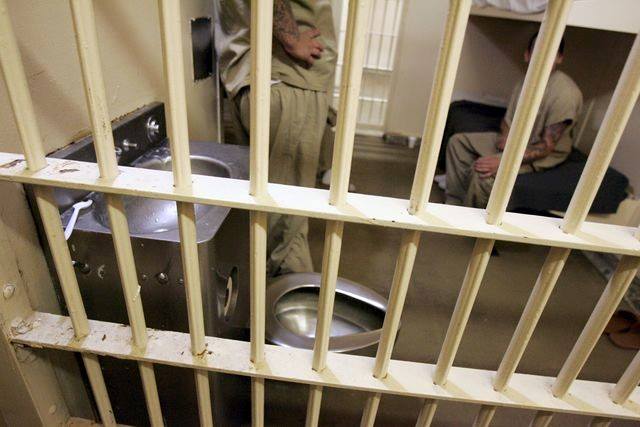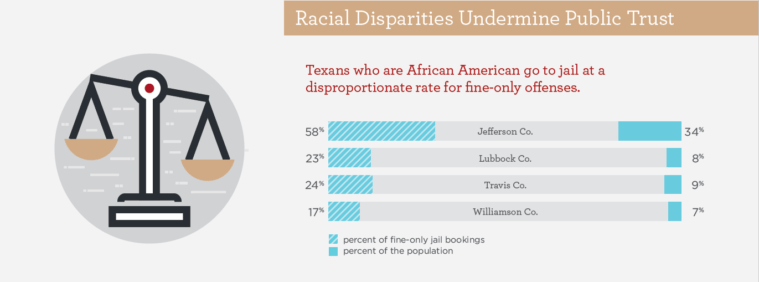
Texas Supreme Court Justice, House Corrections Chair Want to End ‘Unconstitutional’ Practice of Debtors’ Prison
Every year, thousands of Texans go to jail simply because they can’t pay fines for minor offenses.


Drive with an invalid license, drink one too many beers in public or let your dog run free where leash laws say you can’t, and you could get hit with a fine. If you don’t have the money to pay, you could end up serving time in jail instead.
Republicans, including the Texas Supreme Court chief justice and the chair of the House Corrections Committee, want to dismantle that practice, which they say violates the U.S. Constitution and traps thousands of indigent Texans in a cycle of debt.
Jailing a person for his or her inability to pay a fine is illegal under state and federal law, and multiple U.S. Supreme Court rulings have declared the practice unconstitutional. The Texas Constitution states, “No person shall ever be imprisoned for debt.” Yet de facto debtors’ prisons still operate across the state.
During his State of the Judiciary address earlier this month, Chief Justice Nathan L. Hecht said more than half a million minor offenses resulted in defendants sitting out fines in jail last year. Texas judges presided over 7 million such cases, which produced more than $1 billion in fine revenue in 2016, he said. The majority of defendants paid and moved on with their lives, but in 640,000 cases, defendants ended up behind bars.
“It’s very problematic when we’re confining people who cannot pay,” state Representative James White, R-Hillister, who heads the House Corrections Committee, told the Observer. “We’ve got constitutional issues, cost issues, common sense issues and compassion issues here.”
That’s why White is carrying House Bill 1125, which would prevent judges from converting unpaid fines into jail sentences. Representative Diego Bernal, D-San Antonio, made the bill a bipartisan effort when he signed on as a joint author earlier this month.
“Being poor isn’t a crime,” Bernal said in a statement to the Observer. “People shouldn’t be put in jail for their inability to pay fines. That’s not justice; that’s a debtors’ prison.”
Hecht berated the practice for “threatening to drown the defendant in debt” and wasting taxpayer money, a point also raised by a report published Thursday by the Texas Fair Defense Project and Texas Appleseed.
In Texas, it costs about $60 per day to hold a person in jail, according to Mary Mergler, a Texas Appleseed attorney who worked on the report. If each defendant in the 640,000 cases Hecht mentioned spent only one day in jail, the cost of holding them would’ve been $38 million. The real cost is likely higher. In the seven counties — El Paso, Hidalgo, Jefferson, Lubbock, McLennan, Travis and Williamson — examined in the report, more than 600 people were jailed longer than 10 days for fine-only offenses in 2014.
“Courts cannot send you to jail because you don’t have the money to pay a fine; that is a clear violation of the law,” Mergler said. “The report really highlights one of the ways our court system punishes people more harshly based on the amount of money they have.”
Judges are required by state and federal law to determine whether defendants are “actually unable, not just unwilling, to pay a fine,” and an alternative punishment should be arranged in lieu of the fine if a defendant cannot pay, Hecht said in his address.
But the Texas Fair Defense Project and Texas Appleseed report found this “rarely happens,” attributing the oversight to “local policy or mistakes.”
The report also draws attention to racial disparities inherent in the judicial practice. In 2014, black residents made up 34 percent of Jefferson County’s population, yet accounted for 58 percent of all jail sentences for fine-only offenses. The report noted similar discrepancies in Lubbock, Travis and Williamson counties.
White said it’s too early to say whether his measure will clear the Legislature. The bill doesn’t have a companion in the Senate, and it hasn’t yet been assigned a committee in the House. White said it will likely move through the committee he oversees, which consists of five Republicans and two Democrats. He makes a straightforward argument for the bill.

“Voting against this measure, you’re voting against the constitution that you swore to uphold,” White said. “Voting against this means you’re not a compassionate person.”
Correction: An earlier version of this article incorrectly attributed the State of the Judiciary address to Texas Supreme Court Justice Don Willett. Chief Justice Nathan L. Hecht delivered the address. The Observer regrets the error.


